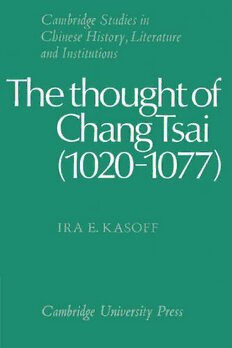
The Thought of Chang Tsai (1020-1077) PDF
224 Pages·2002·5.608 MB·English
Most books are stored in the elastic cloud where traffic is expensive. For this reason, we have a limit on daily download.
Preview The Thought of Chang Tsai (1020-1077)
Description:
Chang Tsai is one of the three major Chinese philosophers who, in the eleventh century, revitalised Confucian thought after centuries of stagnation and formed the foundation for the neo-Confucian thinking that was predominant till the nineteenth century. The book analyses in depth Chang's views of man, his nature and endowments, the cosmos, heaven and earth, the problems of learning and self cultivation, the ideal of the sage - and how that ideal might be attained. It looks at the intellectual climate of the eleventh century, the assumptions Chinese intellectuals shared, and the problems which concerned them. It describes the triumph of Chang's rivals within the neo-Confucian movement and the subsequent emergence of neo-Confucianism to state orthodoxy in the thirteenth century.
See more
The list of books you might like
Most books are stored in the elastic cloud where traffic is expensive. For this reason, we have a limit on daily download.
